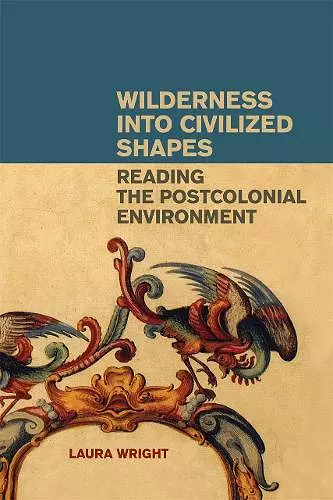Wilderness into Civilized Shapes
Reading the Postcolonial Environment
Format:Paperback
Publisher:University of Georgia Press
Published:15th Apr '10
Should be back in stock very soon

This study examines how postcolonial landscapes and environmental issues are represented in fiction. Wright creates a provocative discourse in which the fields of postcolonial theory and ecocriticism are brought together.
Laura Wright explores the changes brought by colonialism and globalization as depicted in an array of international works of fiction in four thematically arranged chapters. She looks first at two traditional oral histories retold in modern novels, Zakes Mda’s The Heart of Redness (South Africa) and Ngugi wa Thiong’o’s Petals of Blood (Kenya), that deal with the potentially devastating effects of development, particularly through deforestation and the replacement of native flora with European varieties. Wright then uses J. M. Coetzee’s Disgrace (South Africa), Yann Martel’s Life of Pi (India and Canada), and Joy Williams’s The Quick and the Dead (United States) to explore the use of animals as metaphors for subjugated groups of individuals. The third chapter deals with India’s water crisis via Arundhati Roy’s activism and her novel, The God of Small Things. Finally, Wright looks at three novels—Flora Nwapa’s Efuru (Nigeria), Keri Hulme’s The Bone People (New Zealand), and Sindiwe Magona’s Mother to Mother (South Africa)—that depict women’s relationships to the land from which they have been dispossessed.
Throughout Wilderness into Civilized Shapes, Wright rearticulates questions about the role of the writer of fiction as environmental activist and spokesperson, the connections between animal ethics and environmental responsibility, and the potential perpetuation of a neocolonial framework founded on western commodification and resource-based imperialism.
Wright’s deeply provocative and richly nuanced Wilderness into Civilized Shapes represents the current state of play in contemporary postcolonial ecocriticism. . . . Wright provides much needed tools to explore the diversity and urgency of these cultural arrangements with the natural world. This is the sort of book that, for postcolonial scholars, represents the best in the field, while, for those in adjoining disciplines, offering a rewarding invitation to explore an allied field.
* author of Environmental Ethics for a Postcolonial World *Laura Wright effectively brings together postcolonial and ecocritical readings strategies, even as she explores a wide range of postcolonial texts dealing with environmental issues. Her insightful close readings, elegant prose, and effective organization all contribute to making this a groundbreaking study in the emerging field of green postcolonialism.
* author of Joseph Conrad: Reading Postcolonial Intertextuality *Laura Wright offers us wonderful new ways of synthesizing the burgeoning but hitherto distinct fields of postcolonial studies, ecocriticism, and animal studies. Wright deftly negotiates this new turf, analyzing the main conceptual innovations and demonstrating, through smart readings, just what a new environmental-postcolonial-animal studies approach to literature can deliver.
* Rachel Carson Professor of English, University of Wisconsin *Wilderness into Civilized Shapes offers elegant readings of a diverse range of texts as the bedrock from which it is able to articulate significant complications and paradigm shifts to the field of ecocritical inquiry. Wright’s conclusion. . .establishes just what is at stake politically and culturally in postcolonial ecocritical efforts. This is a fitting open-end to an excellent, expansive example of what can be accomplished in the field.
* Safundi *[T]his book represents a valuable contribution to the emerging field of postcolonial environmental criticism.
* Green Letters *[Laura Wright] invites complex understandings of the relationship between textual representation of voice and subaltern subjectivity. . . .[Her] refusal to accept singular perspectives, both theoretical and analytic, reveals a desire to venerate the interconnectedness of peoples, species, and ecosystems.
* ISLEISBN: 9780820335681
Dimensions: 229mm x 152mm x 13mm
Weight: 454g
178 pages